The Lord does not see as man sees.
—1 Samuel 16:7—
As you love God and serve Him, you will undoubtedly experience the greatest adventure life has to offer.
—Bill Bright—
Key point: The expectations and demands God places on those who follow Him aren’t primarily burdensome. They actually give way to a high adventure like none other. Mary and Joseph are among those who would testify that this is true.
Throughout history, God’s people, and especially those among His people who have carried out divine assignments specifically given to them, have assumed and shouldered a variety of burdens and risks, many of them quite heavy. Before we consider risks taken and burdens assumed by major figures involved in the first Christmas, let’s look at a few of the challenges two other leaders faced centuries earlier. First, remember Noah. Scripture tells us that
Genesis 6:5 the LORD saw that the wickedness of man was great in the earth, and that every intent of the thoughts of his heart was only evil continually. 6 And the LORD was sorry that He had made man on the earth, and He was grieved in His heart. 7 So the LORD said, “I will destroy man whom I have created from the face of the earth, both man and beast, creeping thing and birds of the air, for I am sorry that I have made them.” 8 But Noah found grace in the eyes of the LORD.…

13 And God said to Noah, “The end of all flesh has come before Me, for the earth is filled with violence through them; and behold, I will destroy them with the earth. 14 Make yourself an ark of gopherwood; make rooms in the ark, and cover it inside and outside with pitch. 15 And this is how you shall make it: The length of the ark shall be three hundred cubits, its width fifty cubits, and its height thirty cubits. 16 You shall make a window for the ark, and you shall finish it to a cubit from above; and set the door of the ark in its side. You shall make it with lower, second, and third decks. 17 And behold, I Myself am bringing floodwaters on the earth, to destroy from under heaven all flesh in which is the breath of life; everything that is on the earth shall die. 18 But I will establish My covenant with you; and you shall go into the ark—you, your sons, your wife, and your sons’ wives with you. 19 And of every living thing of all flesh you shall bring two of every sort into the ark, to keep them alive with you; they shall be male and female. 20 Of the birds after their kind, of animals after their kind, and of every creeping thing of the earth after its kind, two of every kind will come to you to keep them alive. 21 And you shall take for yourself of all food that is eaten, and you shall gather it to yourself; and it shall be food for you and for them.”
22 Thus Noah did; according to all that God commanded him, so he did.
Some contend that before the Great Flood described in Genesis 6-8, no rain had fallen anywhere on the earth. While debate continues regarding this matter, we need to understand that whether it had rained or not, Noah and his building project surely were targets of derision and ridicule.
Isaac Air Freight, a Christian comedy team well known in Christian circles during the late 70s and early 80s, presented a powerful skit showcasing the pressure Noah and his family were under. The skit uses a modern situation, and, of course, humor, to convey the harsh realities we can be certain Noah faced. He had to be unpopular! Undoubtedly he was hated, laughed at, and ridiculed. Yet in the end, God vindicated him. Give a listen to Isaac Air Freight’s “The Day After Tomorrow Show,” from this You Tube video.
Citing the English Standard Version, a Word Foundations article titled “God’s Spokesmen Warned Their Contemporaries” states,
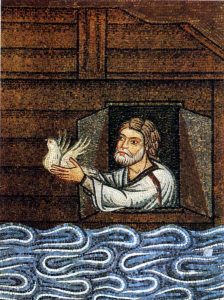
Hebrews 11:7 tells us, “By faith Noah, being warned by God concerning events as yet unseen, in reverent fear constructed an ark for the saving of his household. By this he condemned the world and became an heir of the righteousness that comes by faith.” We read this verse and we’re tempted to cringe, aren’t we? The culture has so drilled into our minds that we must not judge—and we most certainly must never condemn—that we feel a bit uncomfortable with this statement about Noah. While it’s true that Jesus said, “Judge not, that you be not judged,” He didn’t mean for His followers to make no judgments at all. Discernment is essential. Jesus actually was telling believers not to be hypocritically judgmental.
The word translated condemned means just that—to condemn, but it also means to make others’ sins evident and conspicuous by one’s own righteous example. In Hebrews 11:7, this latter definition applies. We must never think this means Noah was arrogant, or condescending, or prideful about his righteousness or about the wickedness prevalent among his contemporaries. On the contrary, I believe he grieved for them and encouraged them to repent. In 2 Peter 2:5, Peter referred to Noah as a “herald of righteousness.” Obviously Noah proclaimed righteousness through his pure life and by building the ark in obedience to God, but he surely also must have encouraged those around him to join him on the ark before God’s judgment fell. Sadly, however, only “a few, that is, eight persons [just Noah and his family], were brought safely through water” because they took refuge in the ark (1 Pet. 3:20).
Noah Isn’t Alone
Moses also carried a number of heavy burdens. In a post citing the Holman Christian Standard Bible and appearing on www.sundayschoolzone.com, I wrote,
After Moses received God’s command to confront Pharaoh and demand that he let the Israelites go, Moses obeyed God. Pharaoh spurned Moses, however, and spurned God as well: “Who is Yahweh that I should obey Him by letting Israel go? I do not know anything about Yahweh, and besides, I will not let Israel go” (Ex. 5:2). Pharaoh also demanded that the slaves gather their own straw for making bricks, even though their quota for bricks did not decrease (see vv. 6-18).
The Israelite slaves who were foremen were understandably upset, and they vented their frustration to Moses and Aaron. “May the LORD take note of you and judge…because you have made us reek in front of Pharaoh and his officials—putting a sword in their hand to kill us!” (v. 21). Moses prayed and asked God why this had happened. He had obeyed God, but his actions apparently had backfired, making things even more difficult for the Hebrew slaves. “You haven’t delivered your people at all,” Moses told God (v. 23).
You might have been asking a similar question of God had you been Moses. When God commissioned Moses to go to Pharaoh, He said, “I have observed the misery of My people in Egypt, and have heard them crying out because of their oppressors, and I know about their sufferings. I have come down to rescue them from the power of the Egyptians and to bring them from that land to a good and spacious land, a land flowing with milk and honey—the territory of the Canaanites, Hittites, Amorites, Perizzites, Hivites, and Jebusites (3:7-8). Did God really know what He was doing? Would He really be able to deliver His people from bondage?
Of course, God not only knew what He was doing, but also when He needed to do it. God’s purpose wasn’t only to free His people, but also to let all of, Israel, Egypt, and the rest of the world know that He was God.
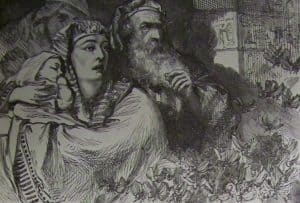
God always knows how to reveal Himself and His power the world — so that the greatest number possible will come to know He is God, and so they will recognize Him for who He is and revere Him appropriately.
Unconventional Wisdom
Yet, we have to be honest. God’s approach defies conventional wisdom. In Isaiah 55:8-11, the inspired prophet penned these words from the Lord,
8 “My thoughts are not your thoughts,
Nor are your ways My ways,” says the Lord.
9 “For as the heavens are higher than the earth,
So are My ways higher than your ways,
And My thoughts than your thoughts.
10 “For as the rain comes down, and the snow from heaven,
And do not return there,
But water the earth,
And make it bring forth and bud,
That it may give seed to the sower
And bread to the eater,
11 So shall My word be that goes forth from My mouth;
It shall not return to Me void,
But it shall accomplish what I please,
And it shall prosper in the thing for which I sent it.
Moreover, the apostle Paul wrote this in 1 Corinthians 1:18-25:
18 For the message of the cross is foolishness to those who are perishing, but to us who are being saved it is the power of God. 19 For it is written:
“I will destroy the wisdom of the wise,
And bring to nothing the understanding of the prudent.”
20 Where is the wise? Where is the scribe? Where is the disputer of this age? Has not God made foolish the wisdom of this world? 21 For since, in the wisdom of God, the world through wisdom did not know God, it pleased God through the foolishness of the message preached to save those who believe. 22 For Jews request a sign, and Greeks seek after wisdom; 23 but we preach Christ crucified, to the Jews a stumbling block and to the Greeks foolishness, 24 but to those who are called, both Jews and Greeks, Christ the power of God and the wisdom of God. 25 Because the foolishness of God is wiser than men, and the weakness of God is stronger than men.
Mary
Let’s move now to consider Mary and Joseph and the special risks and responsibilities they carried before, during, and in the aftermath of the first Christmas. Naturally, we have to start with Mary.
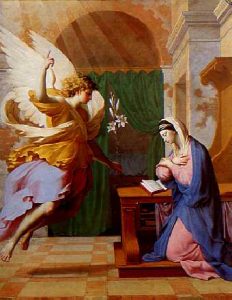
Citing the Holman Christian Standard Bible, the first Word Foundations Christmas article (published December 17, 2015) observes,
When Mary received a visit from Gabriel and learned that she would give birth to God’s Son, she naturally had a question. “Mary asked the angel, ‘How can this be, since I have not been intimate with a man?’” (Luke 1:34). It was a great question! Gabriel “replied to her: ‘The Holy Spirit will come upon you, and the power of the Most High will overshadow you. Therefore, the holy One to be born will be called the Son of God’” (v. 35).
The mystery of the incarnation—God’s becoming a man without ceasing to be God—must ultimately be accepted by faith, for it can never be fully understood by human minds. Yet Gabriel gave Mary—and he gives us—a glimpse of some of the things that were involved in Jesus’ conception.
-
-
-
- The baby would be conceived and would begin to grow in Mary’s womb as a result of the Holy Spirit’s activity and God’s power. This does not mean Jesus’ life would begin in Mary’s womb. No, this wasn’t the case at all, for Jesus has existed from eternity past.…
- “The power of the Most High will overshadow you,” Gabriel told Mary (Luke 1:35).…[W]hen God overshadowed Mary [in this way], He performed a miracle of creation and transcendence that was unparalleled in all of history.
- “Therefore,” Gabriel said, “the holy One to be born will be called the Son of God” (Luke 1:35). The birth that would result would not come because of Joseph’s actions or because of any human influence whatsoever. This was God’s doing, and the One to be born would be God’s own Son.
-
-
It goes without saying that becoming pregnant would put Mary in an awkward position. She had not been unfaithful to Joseph, but would he believe the truth? How would he respond? And what about everyone else?
Despite the risks, as well as the rumors that almost certainly would occur, Mary readily accepted her assignment. She said to Gabriel, “Behold the maidservant of the Lord! Let it be to me according to your word.” A bit later, when she was visiting her elderly relative Elizabeth (with whom she could share everything), Mary broke out in a beautiful expression of praise to God. She truly felt honored the Lord had chosen her for important responsibility of being the mother of Jesus.
Joseph
Now, let’s consider Joseph’s perspective on the unfolding events. We affirmed in a previous post that “Luke 1:26-38 and Matthew 1:18-25 provide the context for” an angel’s appearance to Joseph and some very special instructions from the Lord.
Having become engaged or betrothed to Mary, Joseph discovered she was going to have a baby. [As we already have acknowledged], Mary hadn’t been unfaithful to Joseph but was pregnant by the Holy Spirit—a once-in-history occurrence. Joseph, however, did not know this, although he knew he wasn’t the father. Thinking Mary must have become pregnant by another man, Joseph resolved to call off the wedding; but as a righteous and caring man he didn’t want to make things any harder for Mary than they already would be. He decided to divorce her quietly.
Joseph was in for a surprise! As “he thought about these things, behold, an angel of the Lord appeared to him in a dream, saying, ‘Joseph, son of David, do not be afraid to take to you Mary your wife, for that which is conceived in her is of the Holy Spirit. And she will bring forth a Son, and you shall call His name Jesus, for He will save His people from their sins.”
This was just the first of four angelic appearances to Joseph reported in chapters 1 and 2 of Matthew’s Gospel. After the wise men visited Jesus in Bethlehem, gave Him gifts, and departed by a route that avoided King Herod, Herod flew into a rage and had the baby boys of Bethlehem two years of age and under slaughtered. Joseph had escaped with Mary and Jesus to Egypt, however, because of a second dream in which an angel had warned him of the danger and instructed him to leave.
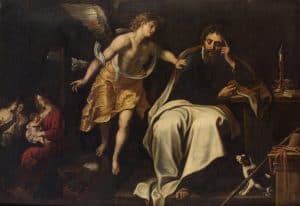
After those wanting to end “the young Child’s life” had died, Joseph had a third dream in which an angel appeared to him and told him, “Arise, take the young Child and his mother and go to the land of Israel.” Joseph, of course, obeyed.
Finally, after Mary’s husband and Jesus’ father by adoption “heard that Archelaus was reigning over Judea instead of his father Herod, he [Joseph] was afraid to go there.” His fears were confirmed by an angel in a fourth dream. God used the dream to warn him of the danger, Joseph “turned aside into the region of Galilee.”
What heavy responsibilities Joseph bore — and we haven’t yet mentioned the “normal” parenting tasks involved in being a father to Jesus. Little did Joseph know what awaited him when he became betrothed to Mary. And yet, he appears to accept these responsibilities without resistance or complaint. He, too, was acting as a servant of the Most High God.
The Stigma of Illegitimacy
Mary’s and Joseph’s journey together, as well as their journeys as individuals, would place on them additional profound burdens and responsibilities. (You can explore some of these in these two articles.) Of all the burdens they carried, the stigma of illegitimacy, or the assumption made by any that Jesus was born as a result of an affair, seems to me to be among the heaviest. Take note! This wasn’t a burden carried by Mary and Joseph alone. Jesus Himself carried it as well. As we noted in our article about Mary,
Mary was indeed favored by God, but her situation also involved great risk. She was certain to be misunderstood. Pregnancies occur as a result of intimacy between a man and a woman. This was going to be a once-in-history exception—but only Mary and a select few in her life would have to understand this. Of course, Joseph, Mary’s husband-to-be, would have to be one of those select few. Many people never came to understand. Years later, the Pharisees would subtly accuse Jesus of having been conceived illegitimately (see John 8:41; context vv. 31-41).
For your convenience, here is John 8:31-41. Note verse 41 in particular.
31 Then Jesus said to those Jews who believed Him, “If you abide in My word, you are My disciples indeed. 32 And you shall know the truth, and the truth shall make you free.”
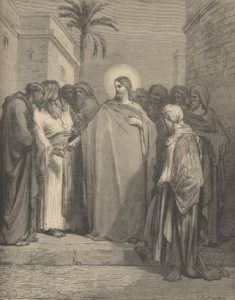
33 They answered Him, “We are Abraham’s descendants, and have never been in bondage to anyone. How can You say, ‘You will be made free’?”
34 Jesus answered them, “Most assuredly, I say to you, whoever commits sin is a slave of sin. 35 And a slave does not abide in the house forever, but a son abides forever. 36 Therefore if the Son makes you free, you shall be free
37 “I know that you are Abraham’s descendants, but you seek to kill Me, because My word has no place in you. 38 I speak what I have seen with My Father, and you do what you have seen with your father.”
39 They answered and said to Him, “Abraham is our father.”
Jesus said to them, “If you were Abraham’s children, you would do the works of Abraham. 40 But now you seek to kill Me, a Man who has told you the truth which I heard from God. Abraham did not do this. 41 You do the deeds of your father.”
Then they said to Him, “We were not born of fornication; we have one Father—God.”
Jesus, of course, had the perfect reply. He
42 said to them, “If God were your Father, you would love Me, for I proceeded forth and came from God; nor have I come of Myself, but He sent Me. 43 Why do you not understand My speech? Because you are not able to listen to My word. 44 You are of your father the devil, and thedesires of your father you want to do. He was a murderer from the beginning, and does not stand in the truth, because there is no truth in him. When he speaks a lie, he speaks from his own resources, for he is a liar and the father of it.45 But because I tell the truth, you do not believe Me. 46 Which of you convicts Me of sin? And if I tell the truth, why do you not believe Me? 47 He who is of God hears God’s words; therefore you do not hear, because you are not of God.”
Being Misunderstood Is Part and Parcel of Being Faithful to God
Why would God put Mary, Joseph, and Jesus in the bull’s eye of being so egregiously misunderstood? While we don’t know the full answer, we do know at least part of it. We already have cited Isaiah 55:8-11 and 1 Corinthians 1:18-25. God’s approach isn’t like ours. He has a plan that is mind-blowing, one that defies all human logic and wisdom. Not surprisingly, we see evidence of this in Jesus’ ministry and teachings.
Remember that the theme of one of our earlier posts was that “Christianity Never Could Have Originated in the Human Imagination.” It’s true. In addition to Isaiah 55:8-11 and 1 Corinthians 1:18-25, consider these words from the apostle Paul in 1 Corinthians 2:14–3:3:
2:14 But the natural man [the one without Christ in his or her life] does not receive the things of the Spirit of God, for they are foolishness to him; nor can he know them,because they are spiritually discerned. 15 But he who is spiritual judges all things, yet he himself is rightly judged by no one. 16 For “who has known the mind of the Lord that he may instruct Him?”But we have the mind of Christ.
3:1 And I, brethren, could not speak to you as to spiritual people but as to carnal, as to babes in Christ. 2 I fed you with milk and not with solid food; for until now you were not able to receive it,and even now you are still not able; 3 for you are still carnal. For where there are envy, strife, and divisions among you, are you not carnal and behaving like mere men?
Again, We Cannot Help But Marvel
All of this fits in beautifully with our last post, “The Wonder of Christmas.” We marvel at Christmas because it is so mind-blowing and, yes, even outrageous. And amazingly, it was all initiated by God for our benefit — even though He is pleased to bring us into His family. Ephesians 1:18 in the Living Bible frames Paul’s words to the Ephesian Christians this way:
I pray that your hearts will be flooded with light so that you can see something of the future he has called you to share. I want you to realize that God has been made rich because we who are Christ’s have been given to him!
Yet, as the Christian musical group 4 Him expressed in a Christmas song written from Joseph’s perspective, God’s way was so amazing, it really was a “Strange Way to Save the World.”
For Mary and Joseph, as well as for Noah, Moses, and every believer who has taken God’s laws and ways seriously, the burdens, risks, and responsibilities incurred give way to an unparalleled adventure.
These are the people Dr. Mark Corts once called the “company of the risk-takers.”
Join them, won’t you? You won’t regret it for a New York minute!
Copyright © 2020 by B. Nathaniel Sullivan. All rights reserved.
top image credit: La Visitation [Mary Visits Elizabeth]— Philippe de Champaigne
Unless otherwise indicated, Scripture has been taken from the New King James Version®. Copyright © 1982 by Thomas Nelson, Inc. Used by permission. All rights reserved.
Some Scriptures cited in this article have been taken from the English Standard Version (ESV). The ESV® Bible (The Holy Bible, English Standard Version®) copyright © 2001 by Crossway, a publishing ministry of Good News Publishers. ESV® Text Edition: 2011. The ESV® text has been reproduced in cooperation with and by permission of Good News Publishers. Unauthorized reproduction of this publication is prohibited. All rights reserved.
Some Scriptures cited are taken from the Holman Christian Standard Bible®, Copyright © 1999, 2000, 2002, 2003, 2009 by Holman Bible Publishers. Used by permission. Holman Christian Standard Bible®, Holman CSB®, and HCSB® are federally registered trademarks of Holman Bible Publishers.
One passage comes from The Living Bible, copyright © 1971 by Tyndale House Foundation. Used by permission of Tyndale House Publishers Inc., Carol Stream, Illinois 60188. All rights reserved. The Living Bible, TLB, and the The Living Bible logo are registered trademarks of Tyndale House Publishers.

Be First to Comment